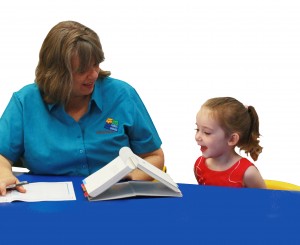
What is receptive and expressive language? Speech pathologists often talk about children’s skills in terms of “receptive language” and “expressive language”. What does this mean ? How are these assessed and how can parents help their child with these difficulties?
Language is a means of sending and receiving messages to communicate ideas. Speech is one way to communicate by using the muscles of the mouth to make sounds to send a message to another person. Other ways to send messages are though signs, gestures, symbols, reading and writing. Language includes all these things. The meaning of these is shared by the group of people who use the language. Within a language there are rules about how messages are sent and interpreted that people who use the language need to learn and follow so messages are sent and understood correctly. Children need to learn the symbols (words) of their language and the rules (grammar) for using them. This takes time and practice and is difficult for some children.
Receptive language is about understanding messages from others. It relies on the message getting to the brain though a healthy hearing system. The brain needs to remember the message and then interprete the message in terms of the meaning of the words (vocabulary), the way the words are structured in sentences (grammar) and the social context of the message (pragmatics).
To develop good receptive language children need:
- Good hearing (or an alternative such as vision for signing)
- Good attention and concentration
- Good auditory memory skills
- A range of good quality, age appropriate language experiences
Children with receptive language difficulties may show:
- Difficulty following instructions
- Difficulty understanding the meaning of words and concepts
- Difficulty learning and remembering new information
- Difficulty listening to, remembering and understanding stories
- Difficulty understanding what they read
- Difficulty understanding conversations
- Difficulty understanding school subjects
Expressive language is about sending messages. The brain needs to form the message using words (vocabulary), structure the words into sentences (grammar) and consider the social context of the message (pragmatics). The child then needs a way to send the message using speech or an alternative method of communicating such as signing or symbols.
To develop good expressive language children need:
- Good speech or an alternative system such as signing
- Good attention and concentration
- An awareness of other people, the need, confidence and desire to communicate
- A range of good quality, age appropriate language experiences
Children with expressive language difficulties may show:
- Difficulty naming people, actions, objects and pictures
- Difficulty forming sentences correctly
- Difficulty describing experiences and telling stories
- Difficulty answering questions
- Difficulty with producing written work
- Difficulty holding conversations
- Difficulty with various school subjects
Common questions
How can I tell if my child’s language is normal or if I should be concerned? Speech pathologists can accurately assess children’s receptive and expressive language skills. Usually this is done using a standardised test. A standardised test is developed by giving the test in the same way to many different children of the same age. This means that when the test is given to your child it can tell you how your child compares to others of the same age. As all children are different a standardised test can tell whether your child has real difficulties or skills within the range of variation that occurs amongst typical children. A speech pathologist can then interpete this in relation to observations of the child in real activities and information from parents, carers and teachers to decide if the child has a difficulty that requires support.
What should I do if my child has difficulties with language? Speech therapy sessions provide activities to target a child’s needs in the most effective way to develop their language skills. Parents are also given activities to follow up at home and strategies for school or child care to help the child develop. A team approach is most effective.
What can I do at home? Providing a rich language experience is one of the most beneficial things a parent can do for their child. This means listening to your child, talking with them and reading with them as often as you can. The Talking Matters website has lots of information about quality language activities for children which parents and carers can download.
Related posts:
Top 10 speech ideas
Top 10 language ideas
Developing grammar
Visuals for preschoolers
Struggling at school
Related Blog Posts
If you liked this post you may also like:
Talk to me with books
Asking Questions
The Benefits of Joint Speech Pathology and Occupational Therapy Sessions (SPOT)
Book Week, All About Stories!



